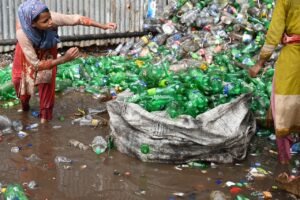“3.5 MILLION CHILDREN AFFECTED ANNUALLY”: MINISTER SOUNDS ALARM ON SANITATION CRISIS IN NIGERIA

The Minister of Environment, Balarabe Lawal had revealed how over 3.5 million Nigerian children suffer from diarrheal diseases every year, largely due to poor sanitation and hygiene practices.
This sobering figure was revealed by the Minister, during a press briefing to mark the 2025 National Environmental Sanitation Day in Abuja.

He warned that children under the age of five are particularly vulnerable, with thousands dying each year from preventable, sanitation-related illnesses.
Lawal said the country faces a silent but deadly crisis where unsafe environments continue to put the most vulnerable, children, the elderly, and those with weakened immune systems, at constant risk.
According to him, many of these diseases, including malaria, Lassa fever, and dengue, are exacerbated by poor sanitation, which creates breeding grounds for disease-carrying vectors such as mosquitoes and rats.

He emphasized that proper hygiene, safe waste disposal, and efficient sanitation systems are essential to safeguarding public health. “These diseases do not just affect individuals,” Lawal said.
“They impact families, communities, and the economy as a whole—through medical costs, loss of productivity, and reduced educational outcomes for children.”
The minister noted that while some progress has been made, access to basic sanitation remains a major challenge in many communities across Nigeria. He described access to safe sanitation as a fundamental human right, critical for protecting human dignity, health, and well-being. Yet, for many, this right is still out of reach.
Lawal praised states that have reinstated monthly environmental sanitation exercises, calling them a practical and effective step toward national health. He expressed optimism that growing awareness of the sanitation crisis is beginning to yield results but warned that long-term change requires a coordinated, nationwide effort.
He also drew attention to the environmental consequences of neglecting sanitation, pointing out that contamination of water sources, soil, and air could lead to long-term degradation and a rise in more complex public health challenges.
The minister called on the media to play a crucial role in this effort by using their platforms to educate the public, promote hygiene practices, and inspire collective responsibility. “The media must help drive positive behavior change and support nationwide commitment to environmental sanitation,” he said.

Lawal reaffirmed the federal government’s determination to meet Sustainable Development Goals 3 and 6—good health and well-being, and clean water and sanitation—by the year 2030,
Speaking further, he revealed that the possibility of reaching these goals will require persistent advocacy, education, and community involvement.
“We must act with urgency, compassion, and unity to change the course of our sanitation story, because this is about saving lives, especially the lives of our children,” Lawal concluded.









